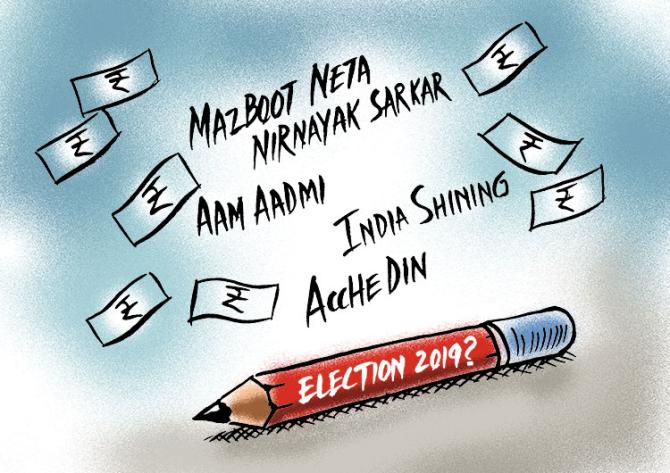'The best-case scenario -- to which Morgan Stanley attaches 30 per cent probability -- pegs the S&P BSE Sensex at 41,500 levels in the next 12 months.'
Puneet Wadhwa reports.

Illustration: Dominic Xavier/Rediff.com
With the markets yet to price in the outcome of the general elections scheduled for May 2019, investors would be better off adding defensive and cyclical counters with a focus on large-cap stocks, suggests Ridham Desai, head of India research and India equity strategist at Morgan Stanley in a co-authored report with Sheela Rathi.
'It is unlikely that the market is as optimistic as it has been in the past going into the 2019 elections. Post-election performance is purely a function of what's been priced in ahead,' Desai and Rathi say.
While Morgan Stanley rules out the possibility of general elections being advanced given an overall improvement in the economy, they expect a weak coalition government to impact execution of projects/policies and also have a bearing on growth and inflation.
Historically, markets been optimistic in the run-up to the general elections.
Since 1991, every election has been preceded by a coalition government; hence, the market has had room to be hopeful of a stronger government, the research house says.
'A minority government has not necessarily been bad for stocks,' Desai and Rathi say.
'Eventually stocks respond to growth and inflation -- economic metrics that are a function of policy choices and global factors.'
'This time, however, the market enters the 2019 polls with a majority government already at the helm, so it has to deal with the prospects of a weaker government at the Centre,' Desai and Rathi add in their Morgan Stanley report.
Against this backdrop, Morgan Stanley advises investors to take a call on the possible outcomes -- an absolute majority for one of the national parties which means winning over 260 seats like the Bharatiya Janata Party-led National Democratic Alliance did in 2014; around 220 seats for two major national parties (the BJP or the Indian National Congress); a coalition with the lead party winning around 180 seats and a weak coalition with the lead party only in a supporting role -- and invest accordingly.
'The direct way to handle the problem is to take a view on the likely election outcome and the ensuing market reaction and tailor the portfolio to match the view: Hence, buy beta and leverage if one believes in a better-than-expected election result and vice versa,' Morgan Stanley says.
The more conservative approach, according to the research house, is to prepare the portfolio for various scenarios.
Though such an approach does not guarantee outperformance for any particular outcome, but is likely to protect portfolios from extreme performance.
The best-case scenario -- to which Morgan Stanley attaches 30 per cent probability -- pegs the S&P BSE Sensex at 41,500 levels in the next 12 months.
Their base-case (50 per cent probability) and bear-case (20 per cent probability) target for the index stands at 35,700 and 25,000 respectively.











